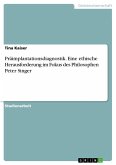Interaction between Peter Singer and Christian ethics, to the extent that it has happened at all, has been unproductive and often antagonistic. Singer sees himself as leading a 'Copernican Revolution' against a sanctity of life ethic, while many Christians associate his work with a 'culture of death'. Charles Camosy shows that this polarized understanding of the two positions is a mistake. While their conclusions about abortion and euthanasia may differ, there is surprising overlap in Christian and Singerite arguments, and disagreements are interesting and fruitful. Furthermore, it turns out that Christians and Singerites can even make common cause, for instance in matters such as global poverty and the dignity of non-human animals. Peter Singer and Christian ethics are far closer than almost anyone has imagined, and this book is valuable to those who are interested in fresh thinking about the relationship between religious and secular ethics.
Hinweis: Dieser Artikel kann nur an eine deutsche Lieferadresse ausgeliefert werden.
Hinweis: Dieser Artikel kann nur an eine deutsche Lieferadresse ausgeliefert werden.
'Here is a first - an attempt to find common ground between the world champion of preference utilitarianism, [Professor] Peter Singer and the global bastion of natural law ethics, the Catholic church, which is both scholarly and yet full of surprises and of interest to ethicists in general and not just those in the camps at the heart of the analysis.' Dr Trevor Stammers, BioCentre (bioethics.ac.uk)








